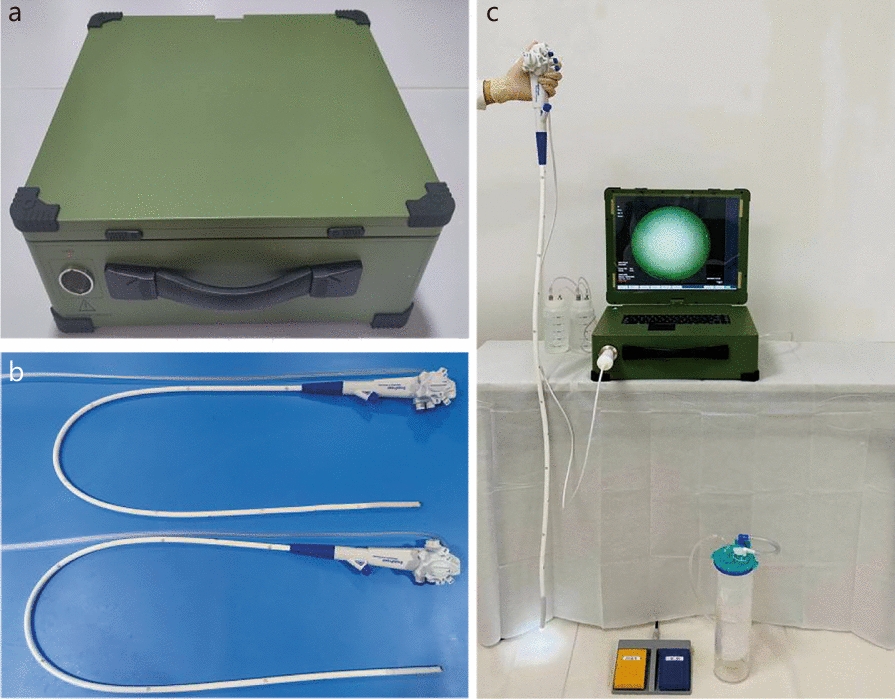
In a groundbreaking study, researchers have evaluated the YunSendo portable endoscope system, a novel medical device designed to address both battlefield and biosafety concerns. Conducted at the First Medical Center of the Chinese PLA General Hospital, this study aims to assess the safety and efficacy of the YunSendo system in both general and critically ill patients.
The study, which began in September 2020, involved a total of 30 patients aged 18 to 75 years. Participants were divided into two groups, with one undergoing both gastroscopy and colonoscopy and the other only gastroscopy. The study’s second phase, conducted during the COVID-19 pandemic in 2023, simulated a wartime biosecurity scenario with 10 emergency department patients experiencing suspected upper gastrointestinal bleeding.
YunSendo Portable Endoscope: A Technological Leap
Developed by the Department of Gastroenterology and Hepatology, the YunSendo system includes a range of components such as a connective cable, foot pedal, and power adapter. Manufactured by Huizhou Xzing Technology Co., Ltd., the system has passed rigorous safety and performance tests, earning certifications from the National Medical Products Administration in China, the European Conformity, and the United States Food and Drug Administration.
The YunSendo system is notable for its portability, featuring a built-in battery for emergency use and a design that supports direct-current power supply. Its single-use endoscopes are made from biodegradable materials, ensuring environmental sustainability. The system’s compact size and lightweight design make it ideal for rapid deployment in emergency and battlefield scenarios, where traditional endoscopy equipment may be impractical.
Clinical Trial Insights and Outcomes
The study employed an open-label, randomized, self-controlled design, comparing the YunSendo system with the conventional Olympus endoscope. The trial aimed to evaluate various parameters, including operation time, image quality, and operational performance. Five experienced gastroenterologists conducted the procedures, ensuring high levels of proficiency and accuracy.
Results indicated that the YunSendo system required slightly longer operation times than the Olympus system. However, its image quality, operational performance, and lesion detection capabilities were found to be non-inferior. Notably, the YunSendo system demonstrated strong diagnostic sensitivity, with no significant adverse reactions reported during the study.
“The YunSendo system’s portability and efficiency make it a promising tool for emergency and battlefield medical care,” said Dr. Xu, lead researcher of the study.
Implications for Emergency and Battlefield Medicine
The YunSendo system’s application in emergency settings was tested on 10 critically ill patients, with procedures including biopsies, submucosal injections, and hemostatic clip applications. The system successfully diagnosed and treated upper gastrointestinal bleeding, with zero mortality rates and no instances of rebleeding reported during follow-up assessments.
The study’s findings suggest that portable endoscopy devices like YunSendo could become indispensable in special environments, offering rapid and accurate diagnosis and treatment. Its compact design and single-use endoscopes eliminate the need for complex reprocessing procedures, reducing the risk of cross-contamination and infection.
Future Prospects and Challenges
While the YunSendo system shows great promise, further research is needed to expand its applications and improve certain features, such as its anti-fog capability. The study also highlights the need for continued development of portable endoscopic technologies to enhance their compatibility with various medical procedures.
As the global healthcare landscape evolves, portable endoscopy systems are poised to play a crucial role in addressing the challenges of emergency and battlefield medicine. With advancements in artificial intelligence, these systems could soon offer even more comprehensive diagnostic and therapeutic solutions.
The YunSendo study marks a significant step forward in the field of portable medical technology, offering new hope for efficient and effective healthcare delivery in challenging environments.






